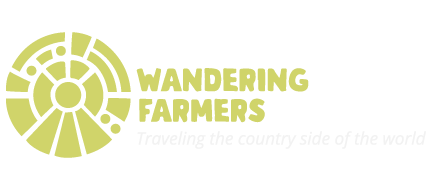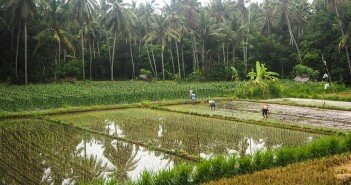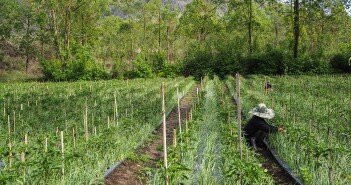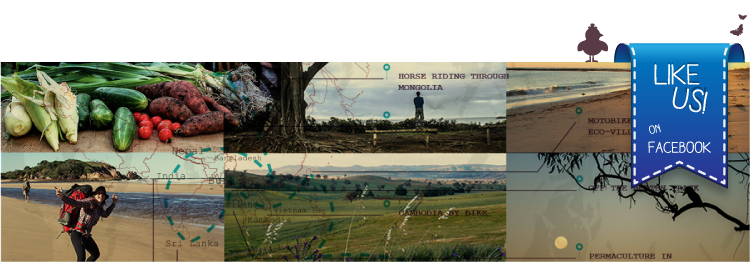“By 1999-2000 Australian farmers needed to produce more than four time the volume to earn, in real terms, only just over half of what they had done in 1951-2” Ted Henzell, Australian Agriculture: 1st History and Challenges, 2007
The food system in Australia is broken. It is forcing Australian farmers to leave their lands, discouraging the youth to take on agriculture and at the same time creating dietary related disease, which is the bigger killer in this country. A lack of policy from governments have led to the Fair Food movement, everyday people and entrepreneurs taking the matter in their own hands.
The Fair Food Movie produced by The Australian Food Sovereignty Alliance (AFSA) documents the work of Australian farmers and food producers in pioneering new approaches to food production, marketing and distribution. They are pioneering a fair food and farming system for consumers and producers across Australia.
“Now it is the time to repurpose and refocus as a community. Now it is the time to build and economy where growth is valued in annual soil depth and fertility that in turn promotes a health industry, not based on sickness but on living food.” Costa Georgiadis, Foreword to the People’s Food Plan, Australian Food Sovereignty Alliance, 2012.
Facts about the Australian food system:
- Coles and Woolworth hold 75 to 80% of the food market
- Australia’s food supply is one of the most concentrated in the world as a consequence; these supermarkets are able to put enormous pressure on farmers and food producers across Australia
- Coles and Woolworth are driving the price for food below cost, a good example is the 1$ for a litre of milk campaign. “Dear Coles, your $1 per litre of milk is killing the lifeblood of our dairy industry.” Jane Polson, Oxley Island Dairy Farmers. Facebook Post July 2012.
- 300 farmers every month are forced to leave their land in Australia
- Australian farmers are 3.5 times more likely to commit suicide than any other professions.
- 40% of crops are going to waste because they are not perfect and not up to the standard of the Australian consumers.
But it is not all bad; we, farmers, consumers and entrepreneurs can do something and the fair food movie is all about showcasing the work of everyday people building a fair food system and how everyone can help.
Solutions for farmers:
We are being told that we need to produce more food when almost half of it is being wasted. Input-intensive agriculture has left our soil depleted and eroded and our river systems are drying up. The rising cost of inputs in agriculture and the powerful lobby of supermarkets have left farmers with no other choice then leaving their land.
“The price hasn’t gone up while the costs have” Bill O’donnell, Coffs Harbour Banana Grower, 2011
The fair food movie urges farmers to take back control of their supply chain and get to know their customers. The idea is to build a system to sell produces outside of the conventional supply chain so farmers get the full dollar of what they grow. Consumers are craving for connection and to know where they food comes from, more and more people want to buy direct to farmers.
Another point the fair food movie makes is the adoption of agroecological practices, which help reduce the cost of inputs and increase resilience in the face of a changing climate. Agroecology also regenerates the land so that future generations can continue to grow more food with fewer inputs.
“Agroecology – Ecological Farming – can double food production in entire regions in 10 years. Today’s scientific evidence demonstrates that agroecological methods outperform the use of chemical fertilizers in boosting food production. Conventional farming relies on expensive inputs, fuels climate change and is not resilient to climate shocks.” Professor Olivier de Schutter, United Nations Special Rapporteur on the Right to Food, 2008-2014
Solution for society:
Let’s stop thinking yield is the most important and the only factor that counts when it comes to growing food.
“It has left the other components to the side having such a narrow field of view, yield yield yield, it is rendering grains indigestible. “ Ben Fawcett, Farmers at Powlett Hill, who recently converted from conventional to Biodynamic agriculture
The film is also urging the Australian government to refuse imported food in our public system, in our school and hospital.
What can Australian consumers do?
The most important and the most obvious one after watching the film is to STOP BUYING FRESH AND PROCESSED FOOD AT COLES AND WOOLWORTH!
Go to the farmer’s market or buy direct. Do not rely on label or get fooled by marketing like Woolworth and its Fresh food scam and get to know your farmers.
“Whom am I giving my health and my wellbeing out to? They say: don’t take a ride in a car with strangers, What about the all concept of your food as strangers, is your food a stranger? Who grew it? Who transported it? […] And more importantly […], how are they nurturing and leaving the land? That’s the big picture. That’s when you really start taking responsibility and say: I want this person looking after me and the land”. Costa Georgiadis Real Food Advocate and Host of Gardening Australia
A long time ago, farmers producing good, nutritious food for the community would have been celebrated. Tell your farmer how good are its produces and how important his work is. They are the one looking after the health of the people and the land!
And the good news is that healthy food grown sustainably will become cheaper. As more consumers buy sustainably and more producers jump on the train and start reducing inputs and regenerating the soil, the land will grow more, not less.
“Good meat become cheaper to produce than cheap meat long term” Grant Hillard & Laura Dalrymple Owners, Feather & Bone.
Though many of these things are already happening, ethical entrepreneurs didn’t wait for the government to do something to offer a fair alternative.
Initiatives already happening
The Open Food Network connects farmers and fair food suppliers across the country directly to consumers. It is and open source project entirely transparent. Consumers are able to know how much the farmers got pay for its produce as well as the cost of retailing and any processes in between. So, jump on the website and discover the fair food producers and retailers in your local area.
CERES Fair Food is a company that goes far beyond providing Organic and local food to communities near Melbourne. They are a social employer, giving jobs to refugees and people with disabilities. They build communities by delivery produce to what they call a food host that might be someone’s shade for example. “When they go to pick it up, they say hello to each others”. They also build relationships with farmers and will stick with them even in bad years.
“More than just the friendship, we are building a stable food system so that farmer knows they can rely on our customers throughout a season so they can plan, they can do their cash flow, things they need, to create a stable business.” Chris Ennis Founder & Manager at CERES Fair Food
Finally all their profits go back to their parent’s organisation, CERES Community Environment Park that runs extensive environmental education programs.
Cultivating communities is a non-for profit organization which run community food projects such as public housing community gardens and school gardens. This is their mission: “to work with diverse and low-income communities to create fair, secure and resilient food systems. Our purpose is to provide relief from poverty for public and community housing tenants and others living in poverty in Victoria through improving access to healthy, affordable, culturally appropriate food.”
You can purchase the movie here, and you probably do, cause there is a lot of other initiatives for a fairer food system described in this documentary. There are still some screenings taking place in Sydney beginning of 2016, over wise contact Tammi Jonas, AFSA President at .
Thursday, 21 January 2016 from 2:00 PM to 4:00 PM (AEDT) At the Kaplan Business School, buy tickets
Saturday, 16 January 2016 from 10:00 AM to 12:30 PM (AEDT) at the Endeavour College of Natural Health, buy tickets.





